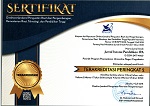Prasangka Positif Atas Perbedaan Agama dalam Konteks Resolusi Konflik Intergroup Relation Siswa Sekolah Menengah Pertama di Provinsi Aceh
Abstract
The purpose of this study was to analyze the positive prejudice against religious differences in the context of intergroup relation conflict resolution among junior high school students in Aceh Province. This study used a survey method by taking a sample of three schools. The researcher collected the data in State Junior High School 1 Banda Aceh, State Junior High School 2 Banda Aceh, and State Junior High School 19 Banda Aceh. The study results showed that 79 percent of students in problem solving did not look at their religious background, while 21 percent of students solved problems based on their religious background. The prejudice of 70 percent of students about the existence of religion was in a positive category. They tended to give the same treatment to friends with different religious backgrounds in solving a problem.
Keywords
Full Text:
PDFReferences
Adelina, F. (2017). Hubungan antara Prasangka Sosial dan Intensi Melakukan Diskriminasi Mahasiswa Etnis Jawa terhadap Mahasiswa yang Berasal dari Nusa Tenggara Timur. Jurnal Sains Psikologi, 6(1), 1-8.
Allport, G. W., & Ross, J. M. (1967). Personal Religious Orientation and Prejudice. Journal of Personality and Social Psychology, 5(4), 432-443.
Anas, M. (2019). Menyemai Nalar Kebhinnekaan dalam Mewujudkan Pendidikan Multikultural. Jurnal Ilmiah Pendidikan Pancasila dan Kewarganegaraan, 4(1), 128-140.Christ, O., Schmid, K., Lolliot, S., Swart, H., Stolle, D., Tausch, N. et al. (2014). Contextual Effect of Positive Intergroup Contact on Outgroup Prejudice. Proceedings of the National Academy of Sciences, 111(11), 3996-4000.
Dahana, A. (1998). Pembauran Lewat Inkorporasi. Majalah Mingguan Gatra, 4(33), 82-83.
Dahesihsari, R., Kartikawangi, D., Ajisuksmo, C. R. P., Sihotang, K., & Murniati, J. (2015). Dynamics of Intergroup Relations among Indonesian Youth. Universal Journal of Psychology, 3(3), 89-95.
Damayanti, A. P., Yuliejantiningsih, Y., & Maulia, D. (2021). Interaksi Sosial Teman Sebaya terhadap Motivasi Belajar Siswa. Jurnal Penelitian dan Pengembangan Pendidikan, 5(2), 163-167.
Dykstra, C. (1986). Youth and the Language of Faith. Religious Education, 8(2), 163-184.
Hafiz, S. E., Nauly, M., Fauzia, R., Pitaloka, A., Takwin, B., Hakim, M. A. et al. (2018). Psikologi Sosial: Pengantar dalam Teori dan Penelitian. Jakarta: Salemba Humanika.
Hanafi, M. (2015). Konsep dasar dan Perkembangan Teori Manajemen. Jakarta: Universitas Terbuka.
Hikam, M. A. S. (2000). Islam, Demokratisasi dan Pemberdayaan Civil Society. Jakarta: Erlangga.
Monalisa. (2017). Kontribusi Persepsi Sosial terhadap Interaksi Sosial Mahasiswa. Jurnal Edukasi, 3(2), 174-184.
Murdianto. (2018). Stereotipe, Prasangka, dan Resistensinya (Studi Kasus pada Etnis Madura dan Tionghoa di Indonesia). Qalamuna, 10(2), 137-160.
Nurmalisa, Y. (2018). Pengaruh Interaksi Edukatif terhadap Konsep Diri Siswa dalam Belajar. Jurnal Ilmiah Pendidikan Pancasila dan Kewarganegaraan, 3(2), 215-219.
Hogg, M. A., & Abram, D. (1998). Sosial Identification: A Sosial Psychology of Intergroup Relation and Group Processes. London: Routledge.
Pettigrew, F. T., Christ, O., Wagner, U., Meertens, R. W., Dick, R., & Zick, A. (2008). Relative Deprivation and Intergroup Prejudice. Journal of Social Issues, 64(2), 385-401.
Paolini, S., Hewstone, M., Caims, E., & Voci, A. (2004). Effects of Direct and Indirect Cross Group Frienships on Judgements of Catholics and Protestants in Northem Ireland: The Mediating Role of an Anxiety-Reduction Mechanism. Personality and Social Psychology Bulletin, 30(60), 770-786.
Sears, D. O., Freedman, J. L., & Peplau, L. A. (1994). Psikologi Sosial. Jakarta: Erlangga.
Setiadi, B. (1993). Peranan Psikologi Sosial dalam Era Pembangunan. Journal Psikologi dan Masyarakat, 1(1), 33-42.
Suharno. (2012). Resolusi Konflik Sosial dari Ruang Kelas dan Vernakularisasi. Yogyakarta: Universitas Negeri Yogyakarta.
Susetyo, B. (2012). Stereotip dan Relasi Antarkelompok. Yogyakarta: Graha Ilmu.
Turner, J. C., Hogg, M. A., Oakes, P. J., Reicher, S. D., & Wethrell, M. S. (1987). Rediscovering the Sosial Group: A Self-Categorization Theory. Amerika Serikat: Basil Clackwell.
Turner, J. C., Oakes, P. J., Haslam, S. A., & McGarty, C. (1994). Self and Collective: Cognition and Social Context. Personality and Social Psychology Bulletin, 20(5), 454-463.
Uslaner, E. (2011). Contact, Diversity, and Segregation. Swedia: Stockholm University, Linnaeus Center for Integration Studies.
Yaqin, M. A. (2005). Pendidikan Multikultural Cross-Cultural Understanding untuk Demokrasi dan Keadilan. Yogyakarta: Pilar Media.
DOI: http://dx.doi.org/10.17977/um019v7i1p1-7
Refbacks
- There are currently no refbacks.
Copyright (c) 2022 Jurnal Ilmiah Pendidikan Pancasila dan Kewarganegaraan

This work is licensed under a Creative Commons Attribution 4.0 International License.
Statcounter View My Stats











